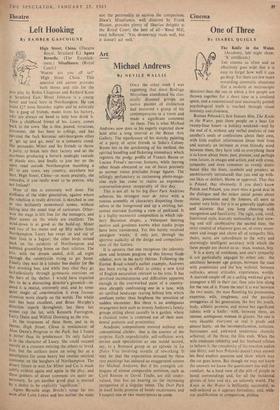Cinema
One of Three
By ISABEL QUIGLY
The Knife in the Water. (Academy, late night show; 'X' certificate.)
Roman Polanski's first feature film, The Knife in the Water, puts three people on a boat for twenty-four hours—a holiday weekend—and by the end of it, without any verbal analysis of one another's souls or confessions about their own, with little explicit information about their lives and scarcely an intimate or even friendly word between them, they have told us everything there is to know about them, past, present, and perhaps even future, in images and action, and with stress, sympathy and even comment so evenly distri- buted (like the hints, symbols and pointers so unobtrusively introduced) that you end up with- out likes or dislikes, blame or approval. That this is Poland, that obviously, if you don't know Polish and Poland, you must miss a good deal in the dialogue and the minor social points about status, possession and the Joneses, all seem to matter very little; for it is so generally applicable and accurate that you keep cheering with recognition and familiarity. The tight, cold, vivid, functional style, scarcely noticeable at first view- ing and still unobtrusive the second time, the strict control of whatever goes on, of every move- ment and image and above all of sympathy (his, theirs, ours), are subordinate to the witty and alarmingly intelligent accuracy with which the three people are shown to us: man, woman, boy.
It is a story of antithesis, and one's sympathy is not particularly engaged by either side : the antithesis between age groups, between the man with possessions and the boy without, between outlooks, sexual attitudes, experiences, worlds. A married couple off on a sailing weekend give a youngster a lift in their car, then take him along for the rest of it. From the start it is war between the two males, the man flaunting his possessions, expertise, wife, toughness, and the peculiar smuggeries of his generation, the boy his youth, body, athletic prowess, and minor but significant talents with a knife: with, between them, an intense, ambiguous woman in glasses. No one is very likeable, everyone so real it prods and almost hurts: on the incomprehension, isolation, barrenness and awkward tenderness clumsily achieved, of the three, the film ends. When the wife confesses infidelity and her husband refuses to believe it, the complexity of his reaction makes one dizzy; and here Polanski doesn't even answer his final explicit question and show which way the car goes home. But though we may not know the answers we know the questioners too well for comfort. As a hard view of the pith of people in banal surroundings and, for all the incidental glories of lake and sky, an unlovely world, The Knife in the Water is brilliantly successful, as well-ordered as it appears fortuitous; and, with- out qualification or comparison, pitiless.


































 Previous page
Previous page